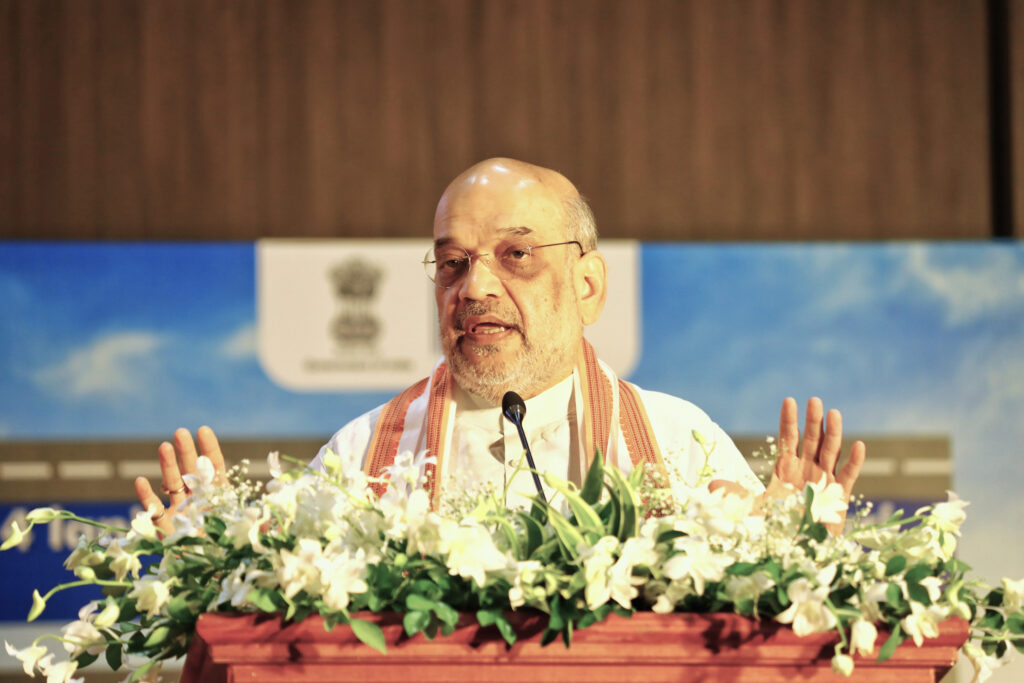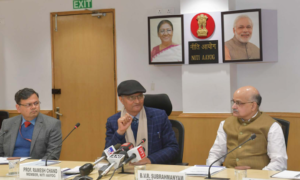India upgrades criminal laws, repeals British-era sedition law

The Union Minister for Home Affairs and Cooperation, Amit Shah presented three new bills to overhaul Indian criminal laws Image: PIB
Union Home Minister and Minister of Cooperation Amit Shah today introduced three new bills in the Lok Sabha – 1. The Bharatiya Nyaya Sanhita Bill 2. Bharatiya Nagarik Suraksha Sanhita Bill and 3. Bharatiya Sakhshya Bill. Shah said that the three bills introduced are in a way fulfilling one of the five vows taken by Modi Ji. All these three bills have basic laws for the criminal justice system.
The new laws will be implemented by abolishing the Indian Penal Code, 1860, Criminal Procedure Code, (1898), 1973, and the Indian Evidence Act, 1872 made by the British and passed by the British Parliament.
The Indian Penal Code, 1860 will be replaced by the Bharatiya Nyaya Sanhita Bill, 2023, the Criminal Procedure Code, 1898 will be replaced by the Bharatiya Nagarik Suraksha Sanhita Bill, 2023 and the Indian Evidence Act, 1872 will be replaced by the Bharatiya Sakshya Bill, 2023.
These three Acts which will be replaced, were made to strengthen and protect the British rule and their purpose was to punish, not to give justice. “We are going to bring changes in both these fundamental aspects. The soul of these three new laws will be to protect all the rights given by the Constitution to Indian citizens. The objective will not be to punish anyone but give justice and in this process, punishment will be given where it is required to create a sense of prevention of crime.”
लोकतंत्र में राजद्रोह का स्थान नहीं है।
— Amit Shah (@AmitShah) August 11, 2023
मोदी सरकार ने राजद्रोह के कानून को हटाने का ऐतिहासिक फैसला लिया है। pic.twitter.com/OUGXLvCtxf
Union Home Minister assured the Lok Sabha that from 1860 to 2023, the criminal justice system of India continued to be operated on the basis of the laws made by the British Parliament, but now these three laws will be replaced with new laws imbibing the Indian soul, which will bring a big change in our criminal justice system.
He said that in the current laws, heinous crimes like murder or crimes against women were placed very low, and crimes like treason, robbery, and attack on the official of the government were kept above these.
The first chapter in these new laws will be on crimes against women and children. The second chapter will be on murder/homicide and criminality with the human body. “We have brought this law by taking a very principled decision of bringing the citizen at the centre instead of governance,” added Shah.
Home Minister said that extensive consultation has been done everywhere to make these laws. He added that in August 2019, he had written letters to all the judges of the Supreme Court, the Chief Justices of all the High Courts of the country, and all the law universities of the country. In 2020, letters were written to all MPs, Chief Ministers, Governors, and Administrators of Union Territories. After extensive consultation, today this process is going to become law. He said that 18 States, 6 Union Territories, Supreme Court, 16 High Courts, 5 Judicial Academies, 22 Law Universities, 142 Members of Parliament, about 270 MLAs, and the public have given their suggestions regarding these new laws. Shri Shah said that for 4 years these were discussed in depth and he himself was present in 158 meetings.
Key Things You Must About Changes in Criminal Laws of India:
Bharatiya Nagarik Suraksha Sanhita Bill, which will replace CrPC, will now have 533 sections, 160 sections have been changed, 9 new sections have been added and 9 sections have been repealed.
The Bharatiya Nyaya Sanhita Bill, which will replace the IPC, will have 356 sections instead of the earlier 511 sections, 175 sections have been amended, 8 new sections have been added and 22 sections have been repealed.
The Bharatiya Sakshya Bill, which will replace the Evidence Act, will now have 170 sections instead of the earlier 167, 23 sections have been changed, 1 new section has been added and 5 repealed.
Shah said that these three old laws were full of signs of slavery, they were passed by the British Parliament and we only adopted them. These laws refer to the Parliament of the United Kingdom, Provincial Acts, Notifications by the Crown Representative, London Gazette, Jury and Barristers, Lahore Government, Commonwealth Resolutions, United Kingdom of Great Britain, and Ireland Parliament.
Home Minister said that state-of-the-art technologies have been incorporated into these laws. The definition of documents has been expanded to include electronic or digital records, e-mails, server logs, computers, smartphones, laptops, SMS, websites, locational evidence, mails, and messages available on devices, which can be used in courts, which will give freedom from the pile of papers.
The provision has been made laws to digitise the entire process from FIR to case diary, case diary to charge sheet, and from charge sheet to judgment. At present, only the appearance of the accused in court can be done through video conferencing, but now the entire trial, including cross-questioning, will be done through video conferencing.
Examination of complainant and witnesses, investigation and recording of evidence in the trial and High Court trial, and entire appellate proceedings will now be possible digitally.
The videography has been made compulsory at the time of search and seizure, which will be part of the case and this will save the innocent citizens from being implicated. No charge sheet will be valid without such recording by the police.
Union Home Minister said that even after 75 years of independence, our conviction rate is very low, that is why we have worked to promote forensic science.
A total of 313 changes have been made in this law which will bring a widespread change in our criminal justice system and anyone will be able to get justice within a maximum of 3 years.
Laws like sedition have been repealed. Provisions of punishment for exploiting women by cheating and heinous crimes like mob lynching, and cracking down on organised crimes and terrorism have also been incorporated.
नए कानून में अब यौन शोषण के मामलों में पीड़िता के बयान की वीडियो रिकॉर्डिंग अनिवार्य होगी।
— Amit Shah (@AmitShah) August 11, 2023
90 दिन के अंदर जाँच अधिकारी द्वारा आरोप पत्र दायर करने की अनिवार्यता से जल्द से जल्द न्याय सुनिश्चित हो सकेगा। pic.twitter.com/mNgGGVaSJu







